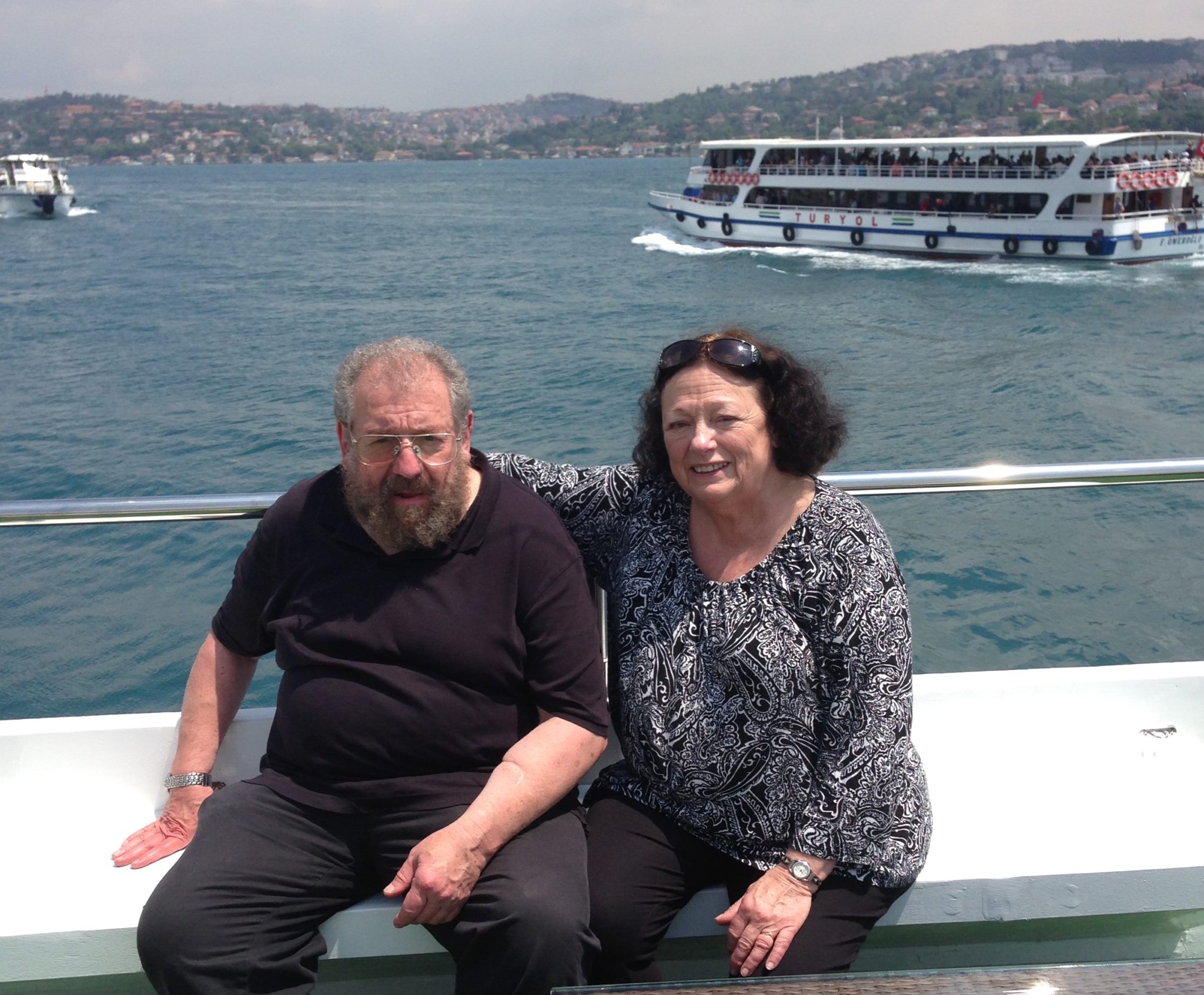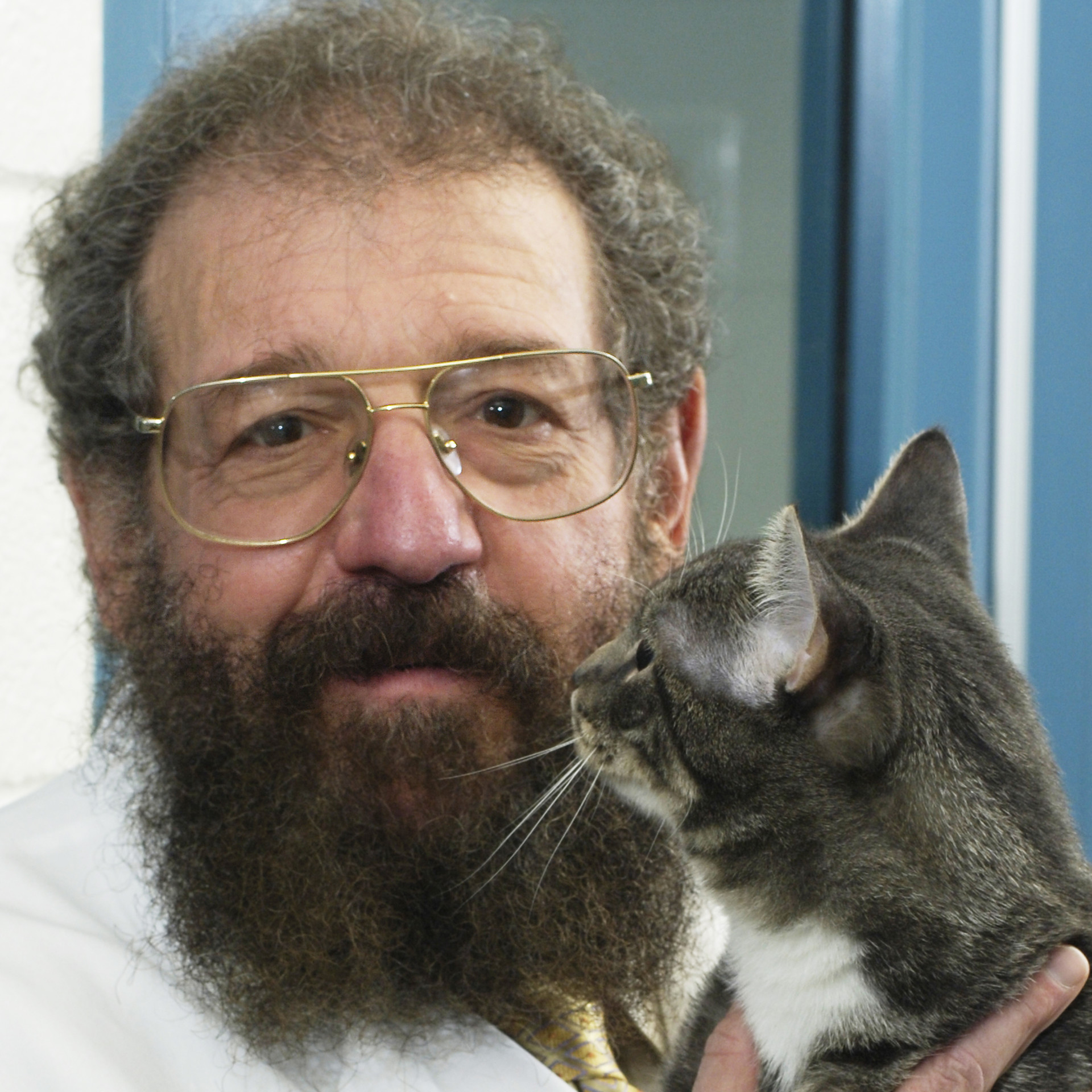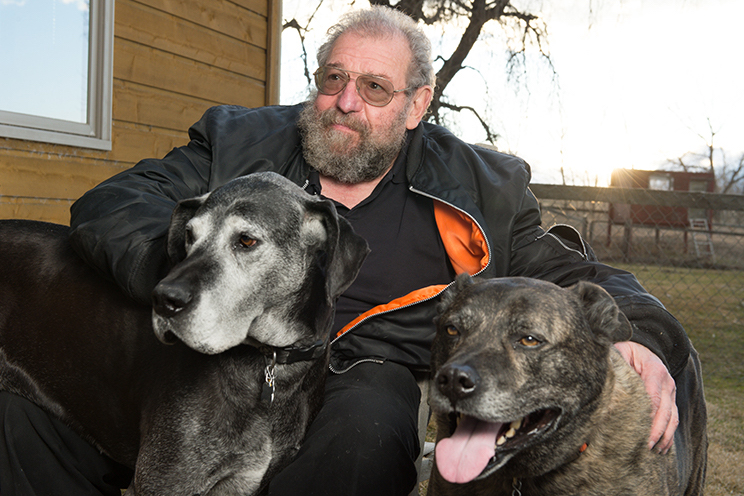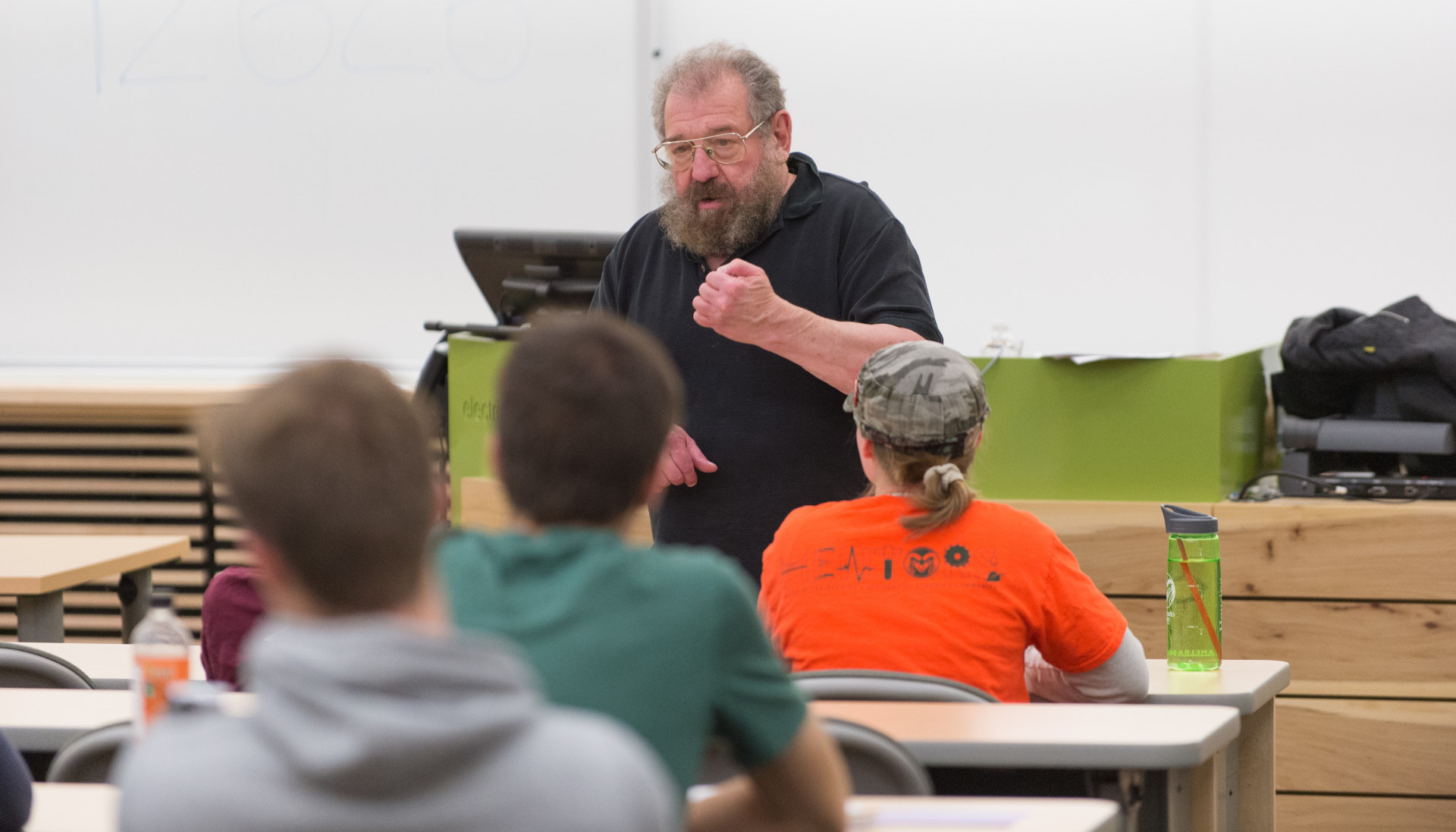The video above was made to commemorate Bernie Rollin receiving a Lifetime Achievement Award for Excellence in Research Ethics from the nonprofit Public Responsibility in Medicine & Research in 2016.
When Bernie Rollin was about to finish his Ph.D. at Columbia University in the late 1960s, he and his wife Linda knew one thing: They wanted to get out of New York and move as far away as they could, to a place that was the complete opposite of the big city.
At a conference in 1968 in Washington, D.C., Bernie met Willard Eddy, the legendary founder of Colorado State University’s Department of Philosophy and the namesake of the building in which it is based.
“He was an Indiana farm boy, very rural, and I had never met anyone like him,” Bernie says of the late Eddy, who chaired two departments during his 56-year career in the College of Liberal Arts. “He convinced me that CSU was a hick school and Fort Collins was just an old cow town, and that appealed to me. Willard sent us a copy of the local paper, and the big news was that a bull had escaped from its pen. There were no muggings or rapes.”
Bernie took a faculty job in Eddy’s philosophy department in 1969, and he and Linda quickly realized that not only was CSU not a “hick school,” but Fort Collins was not a “hick town.” Bernie recalls Eddy laughing about that after the couple arrived, saying, “Pleasant surprise, right?”
Bernie and Linda Rollin both retired in December after logging a combined 99 years at the University. Bernie, a University Distinguished Professor, earned an international reputation as the father of veterinary medical ethics, and some have said he has alleviated more animal pain than anyone else in history. He has lectured all over the world, and is credited with elevating the profile of the philosophy department as well as the entire University. In addition to the philosophy department, he was rostered in the Animal Sciences and Biomedical Sciences departments.
Culture shift

Bernie and Linda Rollin on the Black Sea in Turkey in 2014.
The couple recently shared memories of their decades on campus and in Fort Collins, saying that while it was not the “hick” community they expected, it certainly was a far cry from New York City.
Linda recalls seeing a pamphlet for incoming students at the time that had a segment about transportation called “Your Car, Your Bike, Your Horse.” The publication warned new students that, unfortunately, there were no hitching posts on campus.
“We thought that was a stitch,” she says, adding that a huge snowstorm hit during their first winter in Fort Collins, and a neighbor’s horse would have been the only way to get to campus. “We said, ‘Too bad there are no hitching posts on campus.’”
Bernie did learn to ride on that neighbor’s horse, but it was rough at first.
“I kept thinking I was doing something wrong, because that horse would scrape me along the trees and knock me into the barn,” he remembers. “I later found out that it hadn’t been ‘broken’ yet.”

Linda has fond recollections of learning to adjust to life in Fort Collins.
“Everybody here caught your eye and smiled at you when you passed them on the street,” Linda says. “In New York if you smiled at somebody on the street, they’d think you had bad motives.”
Parking on campus was free, and the Morgan Library parking lot hadn’t been paved yet.
“You left all your stuff in your car, including your car keys,” she remembers. “There was no reason to lock anything up.”
If you forgot to bring your checkbook to the grocery store, you could fill out a “counter check” to make purchases, and when you’d drop soda bottles off at the market for a deposit, you’d just leave them out front and tell the cashier how many you brought.
Locals told the couple to try dining at the Charco Broiler way out on Hwy. 14, and that they couldn’t miss it because of all the pickups out front. Initially, they thought that was a reference to women.
The 1997 flood
One of the Rollins’ most vivid memories of their years at CSU is the Spring Creek Flood of 1997. Below is Linda’s recollection of that time.
“Bernie was in New Zealand with our son Michael, and the two of them were getting ready to tour around the country after Bernie finished with the conference where he was lecturing. It was supposed to be a celebration of Mike’s high school graduation.
The philosophy department offices at that time were in the basement of Eddy Hall, and I had just received a call that our offices were under water. Knowing what Bernie‘s response would be to this bad news, I did not contact him immediately, not wanting to spoil their trip.
But when news of our flood appeared on CNN, I realized that he would find out anyway, so I sent a fax to him at the hotel saying something like, ‘Our offices are flooded, but don’t worry, CSU is taking care of it.’ Naturally, Bernie and Michael took the next plane back home.
The scene was nightmarish. The offices had been in water up to the ceiling for two days; the smell was sickening. They had pumped out a lot of the water, but we were forbidden to enter. Finally, a decision was made that we could enter to retrieve our most valuable items, and were told by someone, ‘You have 30 minutes.’
One of our philosophy colleagues told him, ‘You can’t tell Bernie Rollin he can only have 30 minutes to save his life‘s work,’ so they let us have two hours. It took almost an hour to pry open the wooden door to his office, because it had swelled up while under water.
Despite dire warnings of toxic contamination, Bernie and Mike, straight from their 20-hour flight, accoutered in rubber boots and gloves, armed with laundry baskets and plastic bags, removed what they could. Much was saved. More was lost. Letters from Noam Chomsky and Jane Goodall turned to papier-mâché. Tens of thousands of dollars’ worth of books turned to brick.
In the days that followed, the university hired crews to attempt to salvage books from the library, and some of the professors’ books from the Eddy Building were thrown in with the library’s. Insurance covered none of ours. The university’s insurance did not cover the professors’ property, and the professors’ homeowners insurance did not cover floods. At some point the university did provide a small amount of money to be spent on books, but we were given only a week to spend it for some arcane budgetary reason, and this was long before Amazon made book-buying easy .
After a year being housed in the University Services building, we returned to a newly remodeled Eddy Building, with the philosophy offices on the second floor, and the basement rooms converted to classrooms. I joke that the university planned it that way so in case of the next flood, the faculty’s books would be safe, even if the students drowned.”
Teaching careers

During their early years in Fort Collins, Linda taught English composition for one quarter, then started working on her Ph.D. in mathematics, both at CSU. She taught at the University of Northern Colorado for a short time before teaching math at Colorado State. Linda later joined her husband as an assistant professor in the philosophy department, where she taught logic and critical thinking and built the Core Curriculum Logic Program, teaching graduate students how to teach.
Bernie started out teaching the history of philosophy. One day, a veterinary medicine professor who had an adjacent locker at the gym asked Bernie if he’d consider teaching ethics to vet med students. Bernie asked for the textbook for such a course, and there wasn’t one, so he decided to write it. Animal Rights and Human Morality, published in 1981, was the first of 22 influential books and more than 800 articles that he wrote over the years, including a widely read piece for The Conversation about when to euthanize one’s pet. Some of the award-winning professor’s books were translated into Spanish, Japanese and Portuguese.
“I loved animals, so getting involved with veterinary medicine was a dream,” Bernie says, adding that he was one of the first to question why analgesic drugs were not administered to animals before and after surgery. He and two CSU veterinarians, Harry Gorman and David Neil, spearheaded the effort to make pain control for laboratory animals required by federal law.

“If you can control the pain, why not do it?” Bernie asks. “I developed a reputation as an animal advocate who was not just a bleeding heart but knew what I was talking about. If you showed people that it was in their interest to show concern for the animals they used, they bought it.”
He is credited with helping legendary Animal Sciences Professor Temple Grandin, who he’d met at a conference, get a faculty job at CSU.
Bernie also gained a reputation for being a tough guy who used colorful language and wasn’t one to back down from a fight. He worked out with the CSU football team until last year and could bench-press 505 pounds. Facing a hostile audience of ranchers while giving a talk in 1982 in rural Kiowa, Colorado, he quieted them down by saying he was from Brooklyn and he’d take them outside, one by one. Another time in the 1970s, while dining at the Charco Broiler with a long-haired student, a group of men started making fun of the pair’s hairstyles. Rollin says he put his hand in his pocket to make them think he had a gun.
“The kid with me was a big guy, and I’m a nasty son of a bitch, so they backed off,” Bernie says with a laugh. “But eventually I became quite friendly with the cowboys. They’re good people.”